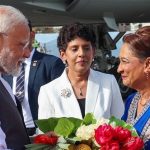The G20 (Group of Twenty) is an international organisation made up of 19 nations plus the European Union, who together account for over 80% of global GDP. Although there aren’t any organisations within the G20 specifically for women, there are numerous women who hold significant positions within these member nations and play significant roles in the forum. Several prominent G20 women include: Angela Merkel (the German chancellor), Christine Lagarde (European Central Bank President), NgoziOkonjo-Iweala (Director-General of the World Trade Organization), Kristalina Georgieva (Managing Director of the International Monetary Fund), Kamala Harris (Vice President of the United States), Ursula von der Leyen (President of the European Commission), Sanna Marin (Prime Minister of Finland), Sheikh Hasina (Prime Minister of Bangladesh), JacindaArdern (Prime Minister of New Zealand) and Erna Solberg (Prime Minister of Norway). Together with other G20 leaders, these women have a significant impact on how decisions are made at the international level regarding a variety of topics, such as trade, economic growth, and climate change.
The G20’s Women 20 (W20) engagement group was created in 2015 while Turkey held the G20 leadership. Its main goal is to make sure that gender concerns are incorporated into G20 discussions and reflected in the G20 Leaders’ Declaration as promises and policies that support gender equality and the economic empowerment of women. However, On December 12, 2022, W20 India replaced W20 Indonesia as the organisation’s leader.
The W20, which is being led by India, has focussed on the ‘women-Led Development’ to create a world of socio-economic equality and equity, dignity and opportunity, transcend and transform the women’s lives along with SDGs. It is also the goal of W20, 2023 to create an ecosystem and atmosphere that will allow them to reach their full potential and improve both their own and other people’s lives. To reach the mentioned goals, India’s Presidency has key initiative areas like Women in Entrepreneurship, Women Leadership at the Grassroots, Closing the Gender Digital Divide, Education & Skill Development, and Women & Girls as Change Makers Climate Resilience Action.
The Indian Presidency, which features the “Vasudhaiva Kutumbakam” logo, has organised and involved multi-level programmes and institutions throughout the last three months. It encompasses discussions, conferences, prizes, and consideration of economic topics from various perspectives. In an effort to inspire replication by other G20 countries, there is need to highlight India’s initiatives, measures, and ground-level action being implemented for women’s economic empowerment by both the government and private sector during India’s G20 leadership.
Although the initiatives like Nari Shakti scheme which finances women entrepreneurs by offering soft loans,the Women Entrepreneurship Platform (WEP), a unified access portal that brings together an ecosystem of opportunity and investment for women’s entrepreneurial aspirations, were already in practice. However, it was India’s G20 Presidency that ignited a new energy into these initiatives. In addition, Indian law also mandates that one-third of the seats in gram panchayats, panchayat samitis, zillaparishads, municipalities, and municipal corporations be reserved for women. A minimum of 50% representation is required in about 21 states, which has aided in establishing regional environments that uplift women and promote their involvement in the workforce. Besides, self-help groups (SHGs) have a long history of success and make a substantial contribution to the advancement of women.
Despite significant national and global targets for bridging the gender gap and gender-budgeting, South Asian women, notably Indian women, have historically had disproportionate opportunities and engagement. Although the causes may be structural or cultural, the fact of their social and economic exclusion from a local to a national level cannot be ignored. In addition, when we examine the G20’s climate change component, history informs us that males have developed industries, the corporate world, and profit-related development whereas women remain attached historically to the nature and natural resources in a more manageable and sustainable manner. One can say real nurture of nature.
Following the same, women are traditionally the knowledge-bearers when it comes to local farming techniques, sustainable resource use, and supporting the local community’s economy through a variety of handicrafts and alternatives. The goals of forums like the G-20 are made possible by all the information women have, but does the traditional knowledge base of women have the chance to expand due to the profit-driven business structures of these organisations? In order to make the Women 20 programme more inclusive and localized, how many local women from Indian traditional societies have been approached or recognized? The purpose of the questions is to encourage local Indian women to participate in these international settings in order to realise their goals of equity and equality.
In conclusion, the concept note of G20 and Women 20, 2023 engages economic and climate goals of development to ‘women connect’ initiatives. The ‘G20 Empowerment and Progression of Women’s Economic Representation’ project focusses on the women’s involvement and representation by increasing workforce and leadership. Further, the ‘G20 Digital Economy and Development Initiative, ‘of the G20, aims to advance gender equality and digital inclusion. But traditional societies actually operate differently. In accordance with their social and cultural contexts, South Asian governments especially India Presidency still have a lot of work to do to promote gender equality. Without addressing the countless benefits and drawbacks that lie at the social and cultural roots, the women and gender-divide cannot be properly addressed.
(The Author is Doctoral fellow, Department of Politics and Governance, Central University of Kashmir. Email: [email protected])








